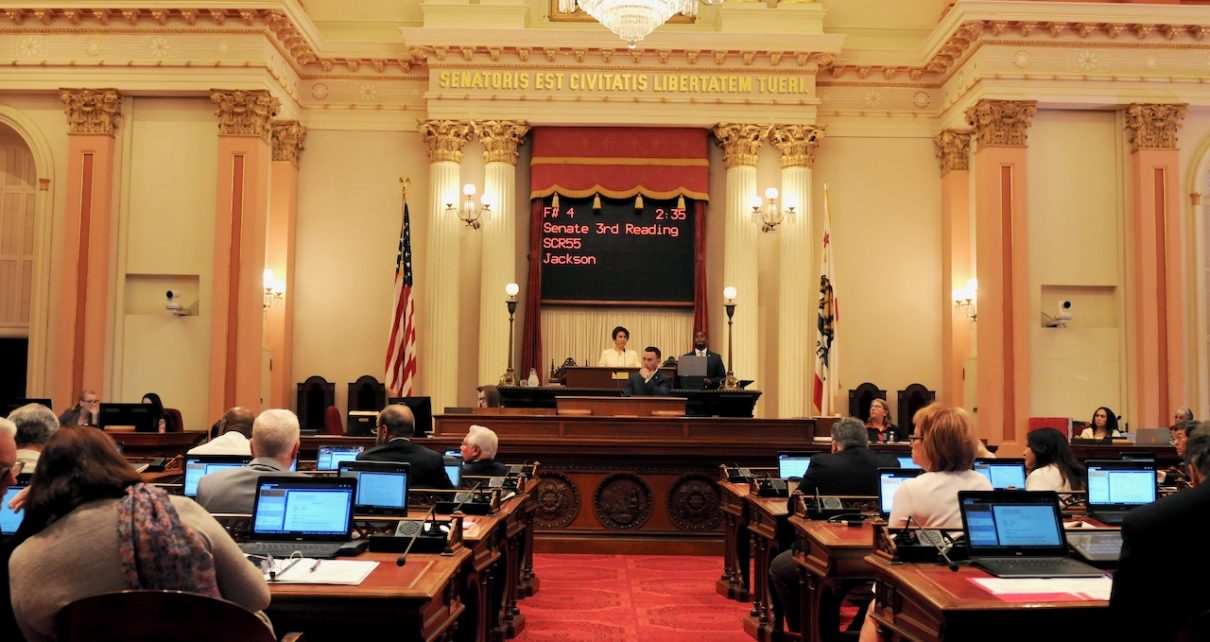
California State Senate. (Photo: Kevin Sanders for California Globe)
Rules of Decorum in the California Legislature
The individual house rules, as well as Mason’s Manual of Legislative Procedure, provide guidance
By Chris Micheli, April 25, 2022 3:13 pm
Both the Assembly and Senate of the California Legislature, like other legislative bodies, utilize several rules, as well as customs and practices, for the purpose of ensuring that legislative deliberations and debate operate in a civil and orderly way. The individual house rules, as well as Mason’s Manual of Legislative Procedure, provide guidance in this regard.
Senate Rules
Senate Rule 21.5, subdivision (j), provides: “The chair shall direct the order of presentation of the arguments for and against matters for consideration by the committee, and shall permit questions to be asked by members of the committee in an orderly fashion and in keeping with proper decorum.”
Senate Rules 35(a) provides: “When a Senator desires to address the Senate, the Senator shall rise at the Senator’s desk, address the Presiding Officer, and, when recognized, proceed to speak through the public address system. When speaking, the Senator shall confine the Senator’s remarks to the question before the house. A Senator who has not been recognized by the Presiding Officer shall not address the body.
“(b) A Senator may not speak more than twice in any one debate on the same day, and at the same stage of the bill, without leave; Senators who have once spoken are not again entitled to the floor (except for explanation) so long as any Senator who has not spoken desires to speak. During the five days prior to the deadline for each house to pass bills introduced in that house and the five days prior to the last day for each house to pass bills, limits may be adopted to expedite the completion of the Senate’s business by limiting the number of speakers per measure, amendment, or debatable motion and the time allotted to each speaker as long as these limits are applied equally to speakers in support and in opposition.
“(c) When two or more Senators arise at the same time to address the Senate, the Presiding Officer shall designate the Senator who is entitled to the floor.
“(d) A Senator may not be interrupted when speaking, and no question may be asked of the Senator except through the Presiding Officer.
“(e) The author or floor manager of a bill, motion, or resolution shall have the privilege of closing the debate, and may elect to answer questions raised in the debate during the author’s or floor manager’s closing.”
Senate Rule 36. Provides: “When a Senator is called to order, the Senator shall sit down until the Presiding Officer has determined whether or not the Senator is in order. Every question of order shall be decided by the Presiding Officer, subject to an appeal to the Senate by any Senator. If a Senator is called to order for words spoken, the objectionable language shall immediately be taken down in writing by the Secretary of the Senate.”
Assembly Rules
Assembly Rule 108 provides: “When a Member desires to address the Assembly, the Member shall rise from the Member’s seat and respectfully address the presiding officer as “Mr. Speaker” or “Madame Speaker.” Upon being recognized, the Member may speak, confining the Member’s remarks to the question under consideration. When two or more Members rise at the same time, the Speaker shall designate the Member who is entitled to the floor.
“A Member may not speak more than once during the consideration of any one question on the same day and at the same stage of proceeding, except that the author of a bill or resolution or the mover of a question has the right to open and close the debate thereon. A Member may not be allowed to speak more than five minutes to open and five minutes to close the debate on any question, including amendments, and no Member other than the author or the mover of the question may be allowed to speak more than five minutes thereon. A Member may not yield to any other Member the time for which the Member is entitled to speak on any matter.”
Assembly Rule 108.1 is titled, “Rules of Decorum,” and provides: “In accordance with Rule 10, Members of the Assembly shall conduct themselves in accordance with the rules of decorum specified in Sections 120 to 126, inclusive, of Mason’s Manual of Legislative Procedure.” In addition, AR 108.1 specifies that the Committee on Rules may adopt additional rules of decorum by majority vote of the membership of the committee.
Mason’s Manual
Chapter 14 of Mason’s Manual is titled “Decorum in Debate” and contains sections 120 – 127. The Assembly Rules specifically incorporate Sections 120 to 126 as applying to their house.
Section 120 is titled “Equality of Members in Debate” and provides that every legislator has the same right as any other legislator to present questions for consideration of the house and has the same right to be heard.
Section 121 is titled “Breaches of the Order of the House” and provides that legislators should not “resort to persistent irrelevance or to persistent repetition.” In addition, during debate, no one should disturb another in his or her speech. Moreover, “the consequences of a measure may be denounced in strong terms; but to attack the motives of those who propose or advocate it is not in order.”
Section 122 is titled “Procedure Under Call to Order” and provides that, when called to order by the presiding officer, the legislator must sit down until the question of order is decided. A legislator who is ruled to be out of order loses the floor and another legislator may be recognized.
Section 123 is titled “Use of Disorderly Words in Debate” and provides that no person may use indecent language with reference to the body (i.e., the legislative body) or its members.
Section 124 is titled “Personalities Not Permitted in Debate” and provides that, in debate, a legislator must confine his or her remarks to the question before the house and avoid personalities. Specifically, “a member in referring to another member should, as much as possible, avoid using his name, rather identifying him by the district which he represents, his seat, as the member who last spoke, or by describing him in some other manner.”
Section 125 is titled “Personal Disputes Between Members” and provides that, whenever there has been a dispute or an assault between members, the body may require the members to settle their differences and agree not to prosecute the disagreement further.
Section 126 is titled “Complaints Against the Presiding Officer” and provides that the presiding officer is subject to the same rules regarding disorderly words as members. A complaint regarding the conduct of the presiding officer is to be presented directly for action by the house.
- Automatic Repeal of State Agency Reports - July 11, 2025
- Confidential Marriages in California - July 10, 2025
- Emergency Protective Orders in California - July 9, 2025







